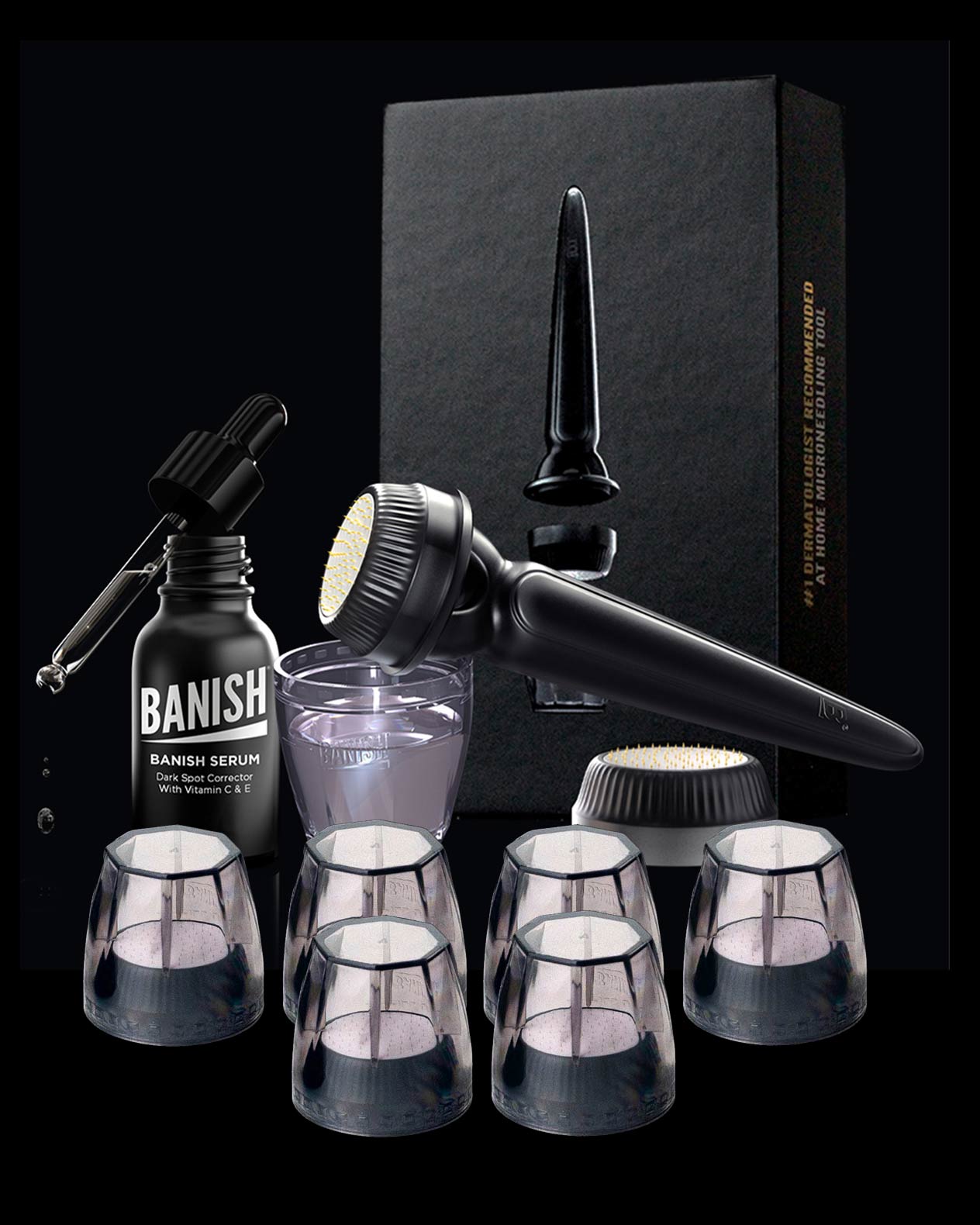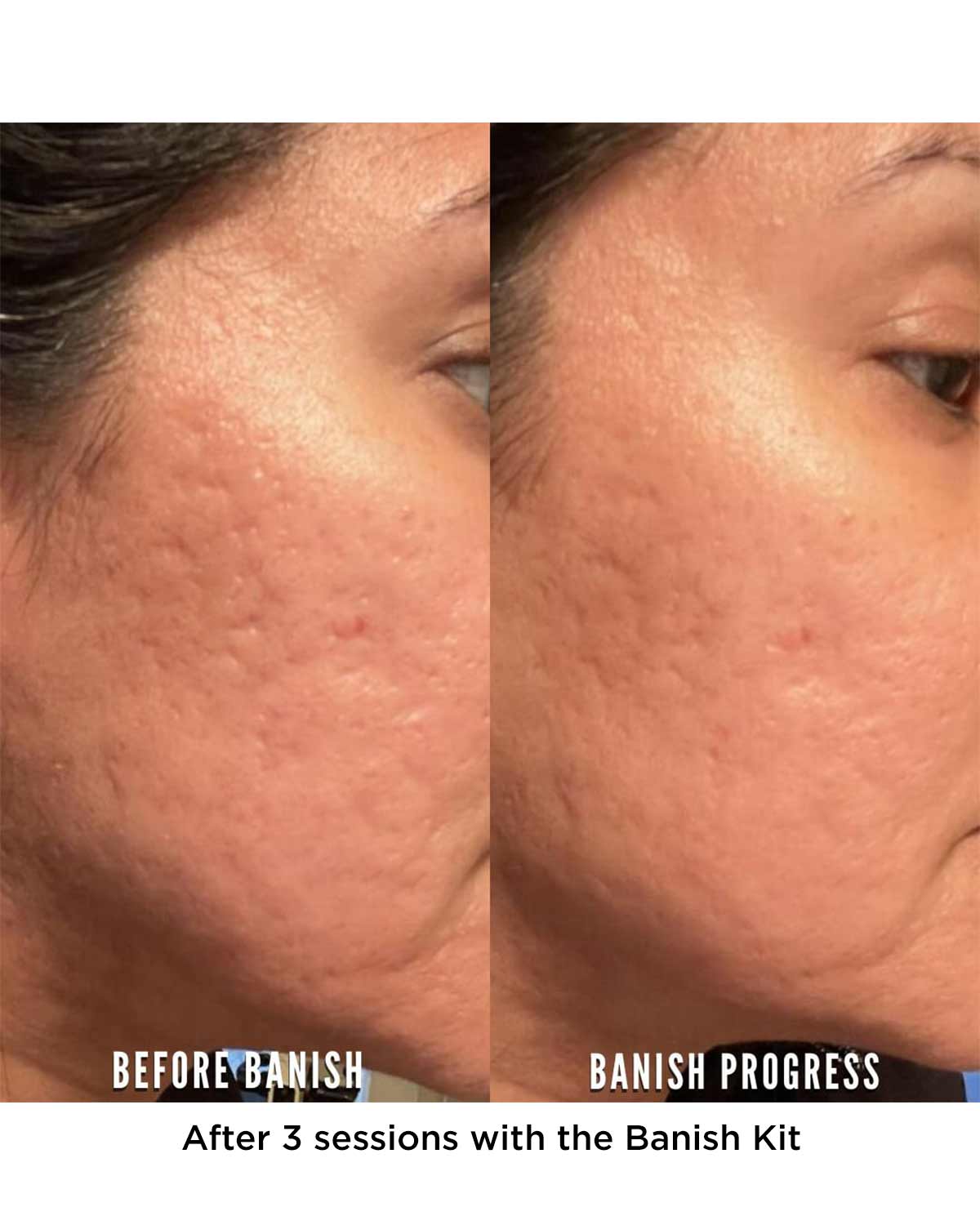The thyroid is a large gland in the neck that secretes hormones regulating growth and development. The thyroid gland produces and regulates thyroid hormones, which can affect energy levels, mood, and even weight. It has long been believed that the thyroid hormone is an important regulator of epidermal homeostasis – that when things go awry with your thyroid, things can also go awry with your skin. Hormones released by the thyroid gland travel through the bloodstream and therefore have the ability to affect practically every part of the body, including the skin.
how thyroid problems can affect our skin
Hypothyroidism (an underactive thyroid), and hyperthyroidism (an overactive thyroid) are two thyroid problems that can and do manifest on our skin.
The skin in hypothyroidism is often characterized as rough, and covered with fine scales. Examination of patient skin with hypothyroidism reveals hyperkeratosis, and is also often pale. In patients with hyperthyroidism, most dermal findings derive from autoimmunity rather than direct thyroid hormone action. Still, hyperthyroidism can cause skin characteristics to change.
Skin manifestations of thyroid dysfunction may be divided into three categories:
1. Direct action of thyroid hormone on skin tissues.
While hypothyroidism can result in coarsened, thin, scaly, dry skin, hyperthyroidism can result in smooth, thin skin.
2. Skin manifestations of direct thyroid hormone action on non-skin tissues.
Hyperthyroidism can result in erythema (redness), and increased hyperpigmentation.
3. Autoimmune skin disease associated with thyroid dysfunction of autoimmune etiology.
For example, eczema.
Clearly the evidence shows that thyroid dysfunction can manifest on our skin in a variety of ways. But dry skin and redness are not acne. Can thyroid problems also cause acne?
potential pathways for thyroid problems to cause acne
The scientific community is already well aware of the effects that hormones can have on our skin, and we know that underlying hormone imbalances can render acne unresponsive to conventional therapy. This means that not only are hormones responsible for some cases of acne, but the hormonal imbalances must also be addressed in order to rid us of these pimply lesions.
Hypothyroidism is known to disrupt vitamin A in the body. Vitamin A and its derivatives play an important role in the regulation of normal growth and development, and affect our skin by encouraging the regeneration of keratin. Vitamin A has been shown to regulate thyroid hormone metabolism, and inhibit thyroid-stimulating hormone (TSH) secretion. In order for the body to convert carotenoids to Vitamin A, the thyroid must be working properly. Since we know that vitamin A supplementation (isotretinoin) can be particularly effective at reducing acne, and that vitamin A supplementation also might be beneficial in reducing the risk of hypothyroidism, it posits a potential pathway for thyroid-induced vitamin A deficiency to affect our skin. However, there is also evidence that vitamin A supplementation (isotretinoin) may also affect the health of our thyroid negatively.
There is also the potential that the decrease in Sex Hormone Binding Globulin (SHBG) as a result of hypothyroidism may increase testosterone levels that can affect hormone receptors in our skin, and thus, also affect our acne. SHBG has a high affinity for testosterone, and will bind to it preferentially over estrogen. Since testosterone and its conversion to DHT are the primary androgens in acne, decreased SHBG as a result of hypothyroidism may lead to a worsening in acne. However, experts mainly associate hypothyroidism or low thyroid function with lower testosterone levels, and elevated thyroid function, or hyperthyroidism, with increased testosterone.
connection between thyroid problems and acne
The internet is a cesspool of awful health and nutrition advice. Some of this terrible information is delivered in such a way, and by such an authority, that makes it appear legitimate. There have been many articles written in favour of an approach to acne and hypothyroidism put forth by Dr. Ray Peat, which includes an elimination of ‘toxic vegetables’ and supplementation with non-regulated and unproven products.
For example, PhD Ray Peat posits that, “Besides fasting, or chronic protein deficiency, the common causes of hypothyroidism are excessive stress or ‘aerobic’ […] exercise, and diets containing beans, lentils, nuts, unsaturated fats (including carotene), and undercooked broccoli, cauliflower, cabbage or
mustard greens (emphasis mine). Many health-conscious people become hypothyroid with a synergistic program of undercooked vegetables; legumes instead of animal proteins; oils instead of butter; carotene instead of vitamin A; and breathless exercise instead of a stimulating life.”
You can see how someone can take their authority to twist the facts in a manner that would promote their conveniently-patented products. Unfortunately, this irresponsible deduction by a supposed authority is reflective of nothing more than a bunch of information with no evidence, and a poor understanding of human physiology. Instead of appealing to authority, we need to be diligent in fact-checking such erroneous claims. In fact, there is no evidence that any of the above stated by Ray Peat is factual, and the most common cause of hypothyroidism is actually autoimmune disease.
Let’s look at the few studies there are out there on thyroid problems and acne:
In one study, 107 women with post-adolescent acne, and 60 healthy controls, were tested for thyroid hormones and antibodies. It found that adult women with acne had a significant increased relative risk to have high levels of antithyroglobulin antibodies in comparison to controls. However, this only indicates that thyroid autoimmunity might be more frequent in adult acne patients, and that there is definitely a need for more research.
In another study, 220 patients with thyroid disease, and 90 healthy controls, were examined and the skin findings were compared statistically. In 56.8% of cases of thyroid problems, there were obvious skin findings present. The most frequently observed skin findings were chronic urticaria, a skin rash like hives (6.8%), vitiligo (6.8%), alopecia (6%), acne vulgaris (5%), and acne rosacea (3.6%). These numbers are quite small, and the important thing to note is that no significance was detected between the patients and the control group – meaning both groups were prone to the same skin issues, regardless of thyroid disease. These are the rates of skin findings we would expect to find among the healthy population. The only statistical significance was found in people with autoimmune disease.
In yet another study, there was no relationship found between thyroid problems and patients with post-adolescent acne.
So, what does all of this mean? We know that there are dermatologic manifestations of endocrine disorders as the skin is an endocrine organ itself, and we know that thyroid problems have various biological pathways to impact our acne, but these study results are inconclusive. The body of research indicates that there really is no direct correlation between thyroid problems and acne.
So, is there any real reason to believe that there is a connection between thyroid problems and acne? Not really, at least not yet. The issue is that some things may increase acne in one person, and leave no effects on another. The human body is a complex dynamic interplay of a variety of contributing mechanisms and activities. But at this time, the evidence for thyroid problems to cause or worsen acne, is pretty weak.
what can I do if i think thyroid problems are causing my acne?
Despite all of this, you may still be convinced that your skin woes are the result of thyroid problems. What steps can you take, then, to improve your chances of eliminating your acne?
Some natural ways to improve thyroid problems include more sleep, a better diet, exercising, and less stress, among others.
However, if real thyroid problems are present, nutritional and lifestyle changes are not always so effective, and medication is often needed to correct the issue. Thyroid problems can cause very serious health issues that require careful monitoring and remediation with a licensed professional. It isn’t something that should be self-diagnosed or self-treated with natural remedies. A simple way to know if you have thyroid problems that could be contributing to your acne is to get bloodwork for your thyroid levels done. It’s best to just take the guess work out of it, so you can focus on the real underlying causes of your acne (See: The Top 6 Reasons You Can’t Shake Your Adult Acne).













Leave a comment
All comments are moderated before being published.
This site is protected by hCaptcha and the hCaptcha Privacy Policy and Terms of Service apply.